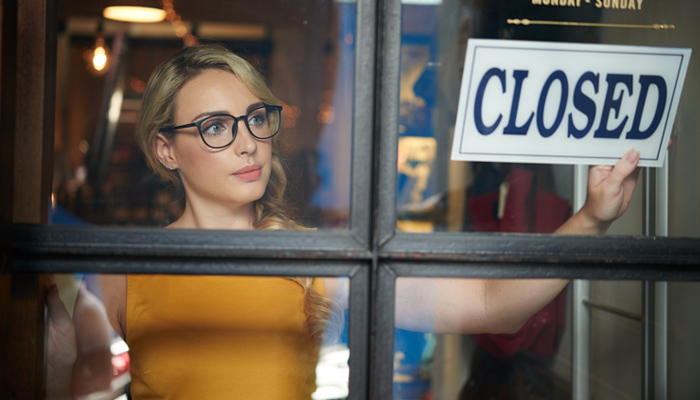The Risk-Takers: Businesses Who Gambled & Succeeded
When opportunity comes knocking, how do you respond? Do you play it safe or do you take a risk? For a lot of business, a risk-averse attitude seems like the best policy, but there are times when a well-calculated risk might be the only thing standing between you and success. In this article, we take a look at five companies that took risks and became better businesses for it.
1. Google
In 1999, two grad students, Larry Page and Sergey Brin, owned a little start-up site called Google. In an effort to unload their pet project and focus on their studies, they approached Excite's CEO, George Bell, and attempted to sell their creation for $1 million USD. Though Bell negotiated them down to $750,000, he ultimately decided not to purchase the search engine.
Page and Brin were stuck with Google—a search engine with no revenue source or solid business model. They took a risk and stuck with it, and today we see how business savvy that risk truly was.
Google's fortunes changed in 2003, when they launched their AdWords campaign, which let businesses advertise on Google searches. That year, the company generated $1.5 billion USD in revenue, thanks in large part to AdWords - which still accounts for most of Google's total revenue and profits. Google's revenue in 2016 was over $89 billion USD.
2. PayPal
When it was first founded in 1998, PayPal wasn't the online payment company we know today. This company, then called Confinity Inc., was first conceived of as a cryptography company and later as a service that transmitted money via PDAs. PayPal took a risk by changing its business model multiple times before it settled into its niche.
PayPal's success stems from its flexibility. The company wasn't afraid to rebrand and rename their company, before eBay bought it for $1.5 billion in 2002. PayPal even faced significant fraud challenges that threatened to sink the company in 2001, but managed to treat to this problem by responding to it like a risk management issue instead of a legal one.
3. Amazon
When Amazon crossed the pond from America, they came into our lives as book retailers. They purchased bookpages.co.uk in 1998 and over the next two decades transformed it into the retail giant we know today. Amazon took a risk by expanding its market beyond books and into electronic goods.
Amazon UK's success story is chequered, however. It only recently began to make money—recording a modest £7.3 billion revenue in 2016. Still, in less than two decades, Amazon has become the leading entertainment retailer in the UK, a success in its own right, that might prove profitable in the years to come.
4. Tesla Motors
The Tesla factory in Fremont, California was almost a pipe dream. While Tesla Motors was officially founded in 2003, the company didn't post profits until ten years later in 2013. However, before they ever got to that point, Tesla was on the brink of collapse. The US economy flat lined in 2008 and Tesla Motors only survived because co-founder Elon Musk invested his last $35 million cash into the company.
Musk's calculated risk won the day. Tesla Motors is worth around $50 billion USD. While the company still struggles to turn a quarterly profit and has faced many setbacks (such as 2015's $3.5 billion loss following the release of the Model X), it continues to revolutionize the electric car industry. In 2015, Tesla's Model S became the world's best-selling plug-in car.
5. Sony
In 1994, Sony launched their first video game console, the PlayStation, into a high risk industry. Nintendo and Sega, two well-established brands, were already battling over market share and both were poised to release "next generation" consoles that could compete with the PlayStation's then-revolutionary hardware. As if that wasn't enough, the video game industry was still recovering from the market crash in 1983.
Despite these challenges, Sony released their new system and their risk paid off. They remain a strong contender in the video game market today, with the PlayStation 4 outselling Microsoft's Xbox One by an estimated 2:1. The original PlayStation remains one of the best-selling video game systems of all time, with over 102 million units sold worldwide. Their risk taking spirit hasn't stop with their launch either—as of March 2016, they're one of the pioneers of Virtual Reality hardware.
The Takeaway
There's a world of difference between a gamble and a calculated risk. Knowing how to recognize one from the other is the difference between smart investments and flushing money down the drain.
However, even well thought out risks sometimes go south, which is why you need a risk management strategy. Your risks may not always pay off the way it has for these companies, but as Ronald Heifetz, a professor at Harvard Kennedy School, said, "Successful people are those who don't become disheartened, and try again."
About the author
 Alison Wild BCom (Hons), MAAT, MATT, Taxation Technician is a highly respected industry professional who has been working with and advising SMEs in areas including tax, pensions, insurance and marketing for over 25 years. She is a member of the Association of Accounting Technicians (AAT) and Association of Tax Technicians (ATT) and also has over 20 years' experience as a residential landlord.
Alison Wild BCom (Hons), MAAT, MATT, Taxation Technician is a highly respected industry professional who has been working with and advising SMEs in areas including tax, pensions, insurance and marketing for over 25 years. She is a member of the Association of Accounting Technicians (AAT) and Association of Tax Technicians (ATT) and also has over 20 years' experience as a residential landlord.
Date: March 21, 2016
Category: Trade










